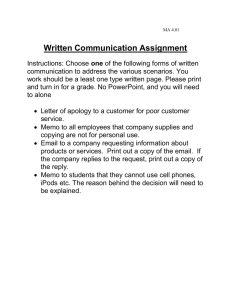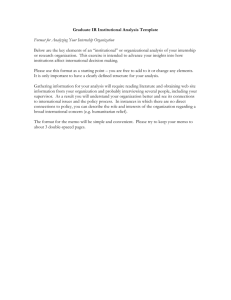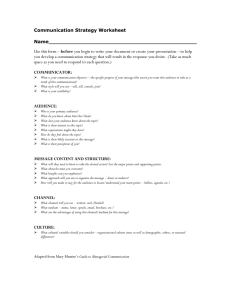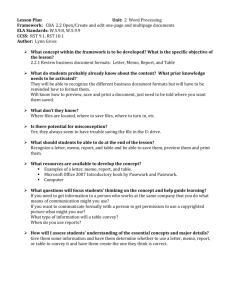RTV 4432 - WordPress.com
advertisement
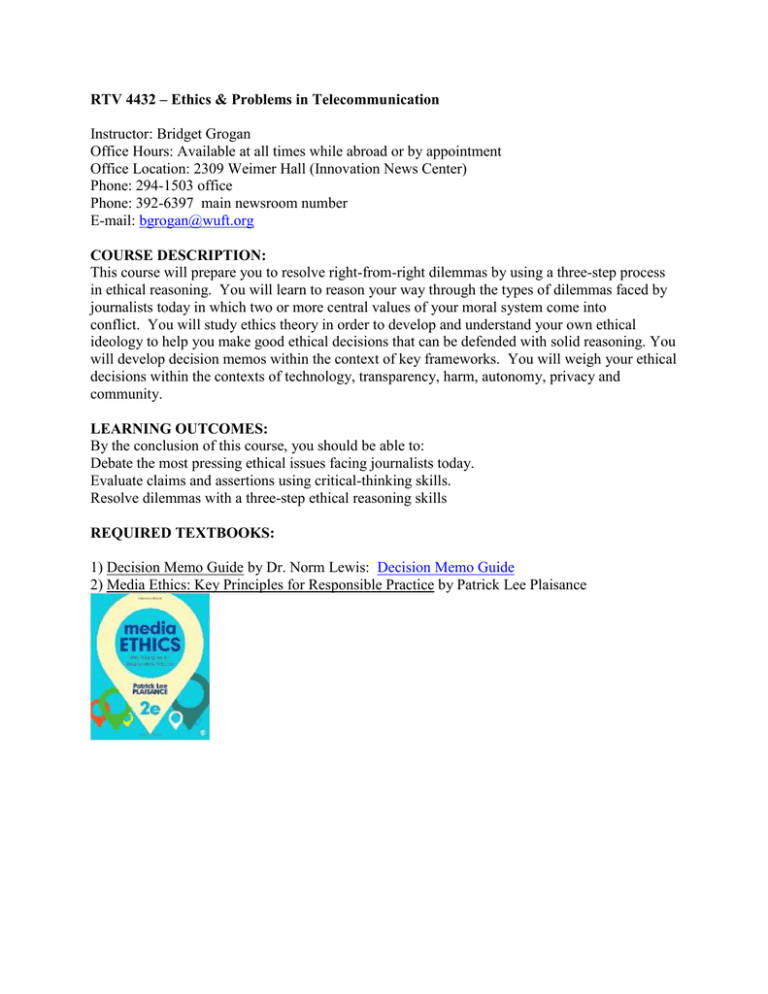
RTV 4432 – Ethics & Problems in Telecommunication Instructor: Bridget Grogan Office Hours: Available at all times while abroad or by appointment Office Location: 2309 Weimer Hall (Innovation News Center) Phone: 294-1503 office Phone: 392-6397 main newsroom number E-mail: bgrogan@wuft.org COURSE DESCRIPTION: This course will prepare you to resolve right-from-right dilemmas by using a three-step process in ethical reasoning. You will learn to reason your way through the types of dilemmas faced by journalists today in which two or more central values of your moral system come into conflict. You will study ethics theory in order to develop and understand your own ethical ideology to help you make good ethical decisions that can be defended with solid reasoning. You will develop decision memos within the context of key frameworks. You will weigh your ethical decisions within the contexts of technology, transparency, harm, autonomy, privacy and community. LEARNING OUTCOMES: By the conclusion of this course, you should be able to: Debate the most pressing ethical issues facing journalists today. Evaluate claims and assertions using critical-thinking skills. Resolve dilemmas with a three-step ethical reasoning skills REQUIRED TEXTBOOKS: 1) Decision Memo Guide by Dr. Norm Lewis: Decision Memo Guide 2) Media Ethics: Key Principles for Responsible Practice by Patrick Lee Plaisance ASSIGNMENTS AND GRADING: Decision Memo Guide test..........................................10% Case Study Worksheets in Spain (4)............................30% Decision Memos (best 4 of 5) completed by July 1.....60% Decision Memo Guide test (10%) to be taken on first day of class This multiple choice test on the Decision Memo Guide is one more incentive to read (not skim) the guide and apply it to new situations. Case Study Worksheets (30%) Each worksheet will be a condensed form of a decision memo: State the dilemma in a single sentence. List two more viable alternatives. Cite an ethical rationale in making a decision in a single sentence. You will get full points if you follow the Decision Memo Guide formula and give a good effort, even if your answers are less than optimal. If the formula isn’t followed or the worksheet is just going through the motions, the worksheet will count for half. Decision Memos (60%) These are completed decision memos according to the formula and examples in the Decision Memo Guide. They will be scored according to the rubric in the guide. You can submit five; the best four will count. I will give you the cases after our time in Spain. *** Prior to the first class, you will be expected to read the Decision Memo Guide to be prepared for a test on the guide. You will also be expected to read Chapter 1 of Media Ethics and take the quiz on pages 18 and 19 regarding your ethical ideology. You will also be required to read ahead in the textbook for class discussions. There will be pop quizzes on some of what you are required to read for class. Class Schedule Subject 1 2 Assignment Due Course Overview, Discussion of Chap. 1 Decision Memo Guide test, Chapter 1 discussion continued (page 21, ques. 7) 3 Chapter 2 - Key Frameworks 4 Chapter 3 - Application to Media Decision Memo Guide Test 5 Chapter 4 - Technology Case-study worksheet 1 6 Chapter 5 - Transparency Case study worksheet 2 7 Chapter 8 - Autonomy Case-study worksheet 3 8 Chapter 9 - Privacy 9 Chapter 10 - Community 10 Wrapup: Preparing for Decision Memos Case-study worksheet 4 Grade Scale: The UF grading policy can be found in the undergraduate catalog online. A AB+ Percent 100-93% 92-90% 89-87% B BC+ Percent 86-83% 82-80% 79-77% C CD+ Percent 76-73% 72-70% 69-67% D D- Percent 66-63% 62-60% Attendance Attendance is mandatory. Per study-abroad policy, anyone coming late (after a 5-minute grace period) loses a half-letter grade for the course, and anyone who misses a class loses a full letter grade for the course. The only exception is if you are truly ill and you let me know ahead of time. (FYI, the mandatory attendance policy also applies to other educational activities during the month abroad such as guided tours and speakers.) Academic Integrity University of Florida students pledge to abide by an honor code that prohibits academic dishonesty such as fabrication, plagiarism and cheating. You have an affirmative obligation to understand what constitutes academic dishonesty. You also must report to appropriate personnel any condition that facilitates academic misconduct. If you have any questions or concerns, please contact me. When I discover cheating, my default policy is to fail all involved for the entire course and report the details to the Dean of Students Office. Students with Disabilities Students with disabilities requesting accommodations should first register with the Disability Resource Center (352-392-8565) by providing appropriate documentation. Once registered, students will receive an accommodation letter, which must be presented to me when requesting accommodation. Please request that accommodation and letter in the spring, before we depart. Help With Coping The UF Counseling and Wellness Center is a terrific, free resource for any student who could use help managing stress or coping with life. The center, at 3190 Radio Road on campus, is open for appointments and emergency walk-ins from 8 a.m. to 5 p.m. Monday through Friday. To make an appointment or receive after-hours assistance, call 352-392-1575. If you need assistance while we’re in Europe, call on any faculty member or AIFS staff member. Course Evaluations Students are expected to provide feedback on the quality of instruction in this course by completing online evaluations. You will be notified by email when the evaluations are open, near the end of Summer C. Summary results are available to you and the public.
